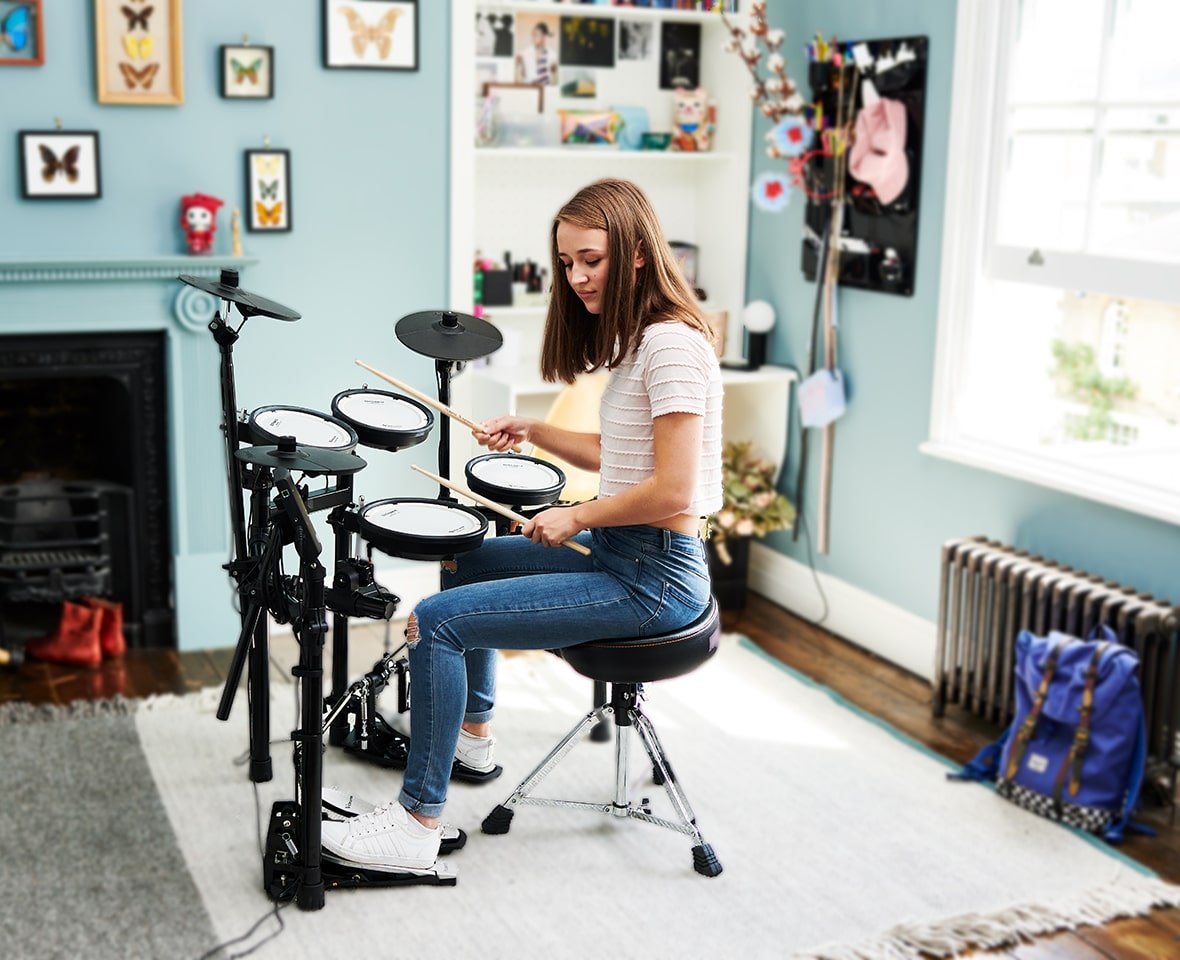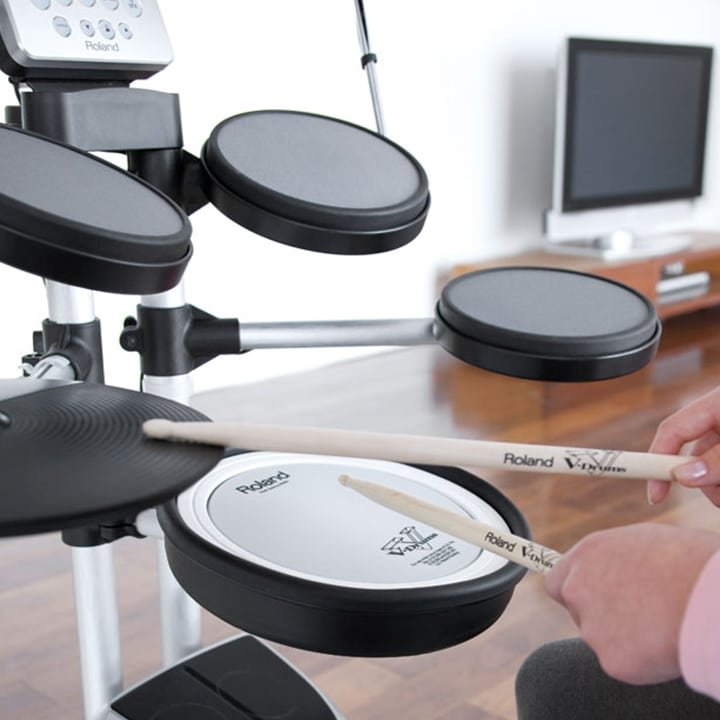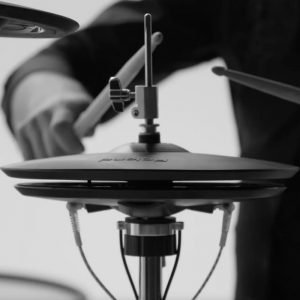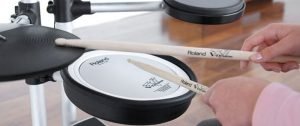You’ve been to the gigs, elbowed your way to the front at the festivals and watched the band’s every TV spot. The drummer is behind the drum kit thrashing away, lost in the music, bashing the skins as if nobody was watching. You’ve decided you want in – you’re ready to emulate your heroes and make the jump to centre stage.
Luckily for you, you’ve chosen the best instrument of all (in this drummer’s opinion at least) – the drums. But before you rush down to the local music emporium, you need to know what’s what.
Contributed by Roland UK
IS IT EASY TO LEARN THE DRUMS?
That’s the million dollar question. Maybe the real question for some is, “Can I play the drums really well, really quickly, with minimum effort?”
Well, not really, no. Sure, maybe you’ve got natural talent that’s waiting to be harnessed, but even the best drummers in the world didn’t get there without effort. It’s all about learning the basics and then practicing… and then practicing some more.
Most importantly, it’s never to late to start! Here’s an article on the subject.
There’s plenty of online video lessons about learning drums, there’s even software available to help you learn. To begin with though, you need to start with the basics, also called rudiments. Once you’ve grasped several basic rudiments, you’ll be nailing ‘We Will Rock You’ in perfect time before you know it.
See Melodics for V-Drums interactive software here.
DO I HAVE TO TAKE DRUM LESSONS?
It’s a personal thing. Some drummers have succeeded without ever taking a single lesson, but many of the best in the world have studied their craft and learned from professionals.
There are plenty of materials out there to get you started, from online tutorials to DVDs, books and CDs. But at some point in their journey, many drummers will benefit from having an expert to turn to, to ask questions, separate good technique from bad and to generally guide their learning.
Some drum teachers like to use grades, which require taking exams. Some tutors feel there is value in a more flexible, less prescriptive method of learning. It’s about finding what works best for you.
WHAT DO I NEED TO GET STARTED?
To start with, sticks and a practice pad will do. But this will only take you so far, and a rubber pad gets pretty tedious, pretty quickly. For that reason, there are practice pads available that are more interactive and can coach you through your stick skills.
See the V-Drums range explained here
You’re also going to need to play in time, so a metronome (sometimes called a click) will be essential. This is one of the advantages of a Roland electronic drum set – even the basic kits have a built-in metronome.
But at some point, you’re going to need a kit. Choosing a drum kit is not straight-forward. There are plenty of kits available and it can be tempting to go for the cheapest, to give you something you can play right away. It’s worth remembering that a musical instrument is an investment, and you’ll only get so far with bargain price ‘starter kit’ from a catalogue before you outgrow it. So it can be worth investing in an instrument that you can continue to use as you develop. This leads us on to the most commonly asked questions…
SHOULD I LEARN ON AN ACOUSTIC DRUM KIT OR AN ELECTRONIC DRUM KIT?

This is another important question – one that comes up so often.
Here are some videos that show how you can apply common acoustic drumming techniques in the very same way to V-Drums.
The rule of thumb is, get learning and practicing. Some drummers may have lessons on an acoustic kit, but practice on an electronic kit. But, drumming is drumming and learning the patterns, rudiments and techniques are the priority and both camps will offer this. Whatever you choose, there are pros and cons to consider:
Learning on Acoustic Drums
- An acoustic kit is usually larger than an electronic kit. If you’re going from an electronic kit to an acoustic kit, the acoustic can seem much bigger, especially for younger players. It’s good to learn how to set-up, tune and play an acoustic kit.
- There’s no hiding it, acoustic drums can be loud – which is part of the appeal! Noise damping pads are available to kill the noise as much as possible, but the experience is ultimately unexciting.
- Each acoustic kit has its own specific sound. In drumming, different musical styles require different drums, cymbals, and tones. Experienced drummers will have a whole range of acoustic drums and cymbals that they can interchange for this reason.
- The acoustic playing experience can be great. When you know what you’re doing and how to tune and set up acoustic drums, the ‘feel’ for the drummer is fantastic and can be hard to replicate with an electronic kit.
Learning on Electronic Drums
- Electronic drum kits are smaller and more compact, which is a big advantage for playing at home. Some kits can even be packed away after use! But playing an acoustic kit can feel different and much bigger if an electronic kit is what you are used to.
- They’re also much quieter, another advantage in the home or where noise is to be minimized. But don’t be fooled into thinking all electronic drums are silent. Depending on the brand and budget, some can almost be as loud to play as acoustic drums. The Roland TD-1 series is acknowledged as being the quietest on the market.
- Electronic kits have interchangeable sounds, essentially offering many kits in one. Roland V-Drums have hundreds of interchangeable drum, cymbal, effect and melodic sounds that can be swapped around and customized. The TD-07KV has a user-editable sound engine and features designed specifically to make learning fun and easy.
- Electronic kits have tools to help you improve. It’s important to regularly practice with music and a metronome (or click) to improve timing. Roland V-Drums offer a range of ways to connect to music and specific tools to help improve timing and show your progress.
Whatever kit you invest in, you’re about to embark on a journey that can be as much fun as it can be rewarding. Who knows where it might take you…
Related Articles
Melodics for V-Drums Software
TYPICAL DRUM PLAYING TECHNIQUES WITH V-DRUMS
IT’S NEVER TOO LATE TO LEARN THE DRUMS










